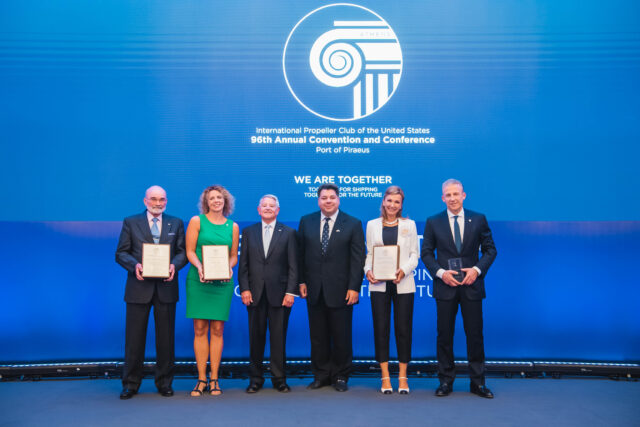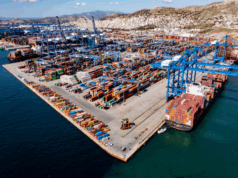Greek ports acquire global strategic prominence and western sanctions on Russian energy exports cause major disruption for shipping industry
The importance of the port of Alexandroupolis for peace and stability in the Southeast Europe and East Mediterranean regions, and for the economic growth of Greece due to its geostrategic location, was highlighted during the opening day of the 96th Annual Convention and Conference of the International Propeller Club of the United States currently being held in Athens till today, Thursday 22 September.
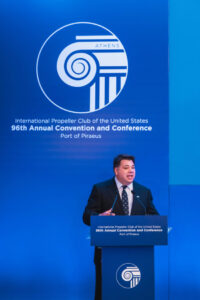 “An unprovoked war in Ukraine continues to disrupt global shipping and as a result, it is no secret that the geostrategic importance of Greece has been elevated significantly,” said His Excellency, George James Tsunis, US Ambassador to Greece, during his opening remarks addressing an audience of 300 Propeller Club members from around the world, members of the Greek and international shipping community, Greek government and US Embassy officials.
“An unprovoked war in Ukraine continues to disrupt global shipping and as a result, it is no secret that the geostrategic importance of Greece has been elevated significantly,” said His Excellency, George James Tsunis, US Ambassador to Greece, during his opening remarks addressing an audience of 300 Propeller Club members from around the world, members of the Greek and international shipping community, Greek government and US Embassy officials.
In his remarks, Giannis Plakiotakis, Greek Minister of Maritime Affairs and Insular Policy, highlighted the role of Greek ports as home to new LNG infrastructure to help Europe overcome the energy crunch: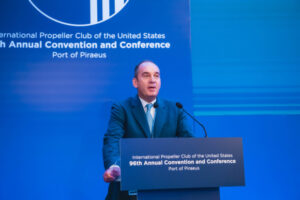 “When it comes to LNG, the major role of the Greek fleet in both LNG transportation, not least from the US those days, as well as in storage through FSRUs as part of the EU energy independence, both in Greece and other EU countries, is widely recognized, alongside the strategic importance of our ports shipping.”
“When it comes to LNG, the major role of the Greek fleet in both LNG transportation, not least from the US those days, as well as in storage through FSRUs as part of the EU energy independence, both in Greece and other EU countries, is widely recognized, alongside the strategic importance of our ports shipping.”
The construction and operation of the Alexandroupolis Floating Storage and Regasification Unit (FSRU) is expected to strengthen the strategic role of Greece as an energy hub for the wider region of Southeastern Europe and will offer alternative sources and gas supply routes to the region, enhancing energy security of supply and energy autonomy, during challenging times.
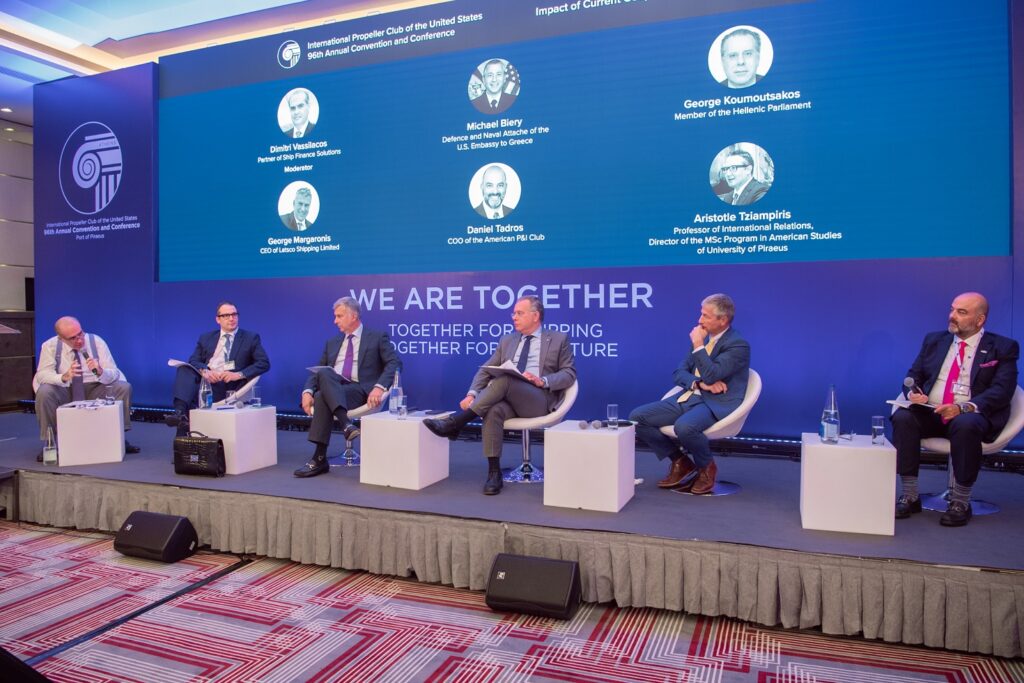 Aristotle Tziampiris, Professor of International Relations, University of Piraeus said: “FSRUs are the quickest way to import LNG. We have more LNG flowing from around the world, especially the US, Qatar, Australia East Africa. We need to set less consumption as a goal and maybe some rationing and addition of new routes. Self-sufficiency for Europe is not a realistic goal, overnight. However, the response to address the energy crunch issue has been fast and impressive, all things considered”.
Aristotle Tziampiris, Professor of International Relations, University of Piraeus said: “FSRUs are the quickest way to import LNG. We have more LNG flowing from around the world, especially the US, Qatar, Australia East Africa. We need to set less consumption as a goal and maybe some rationing and addition of new routes. Self-sufficiency for Europe is not a realistic goal, overnight. However, the response to address the energy crunch issue has been fast and impressive, all things considered”.
According to George Koumoutsakos, Member of the Hellenic Parliament, who participated in a panel discussion around the impact of current geopolitical developments on trading patterns, energy routes and East Med ports, Alexandroupolis is also significant in relation to peace and security in the region due to the Mutual Defense Cooperation Agreement (MDCA) between Greece and the US.
“We expand the number of facilitations that we are giving to our NATO allies and our cooperation in Alexandroupolis port is a great example. We have also broadened and deepened our cooperation with Israel Egypt and Jordan and have established a system of cooperation regional schemes which has received the full support of the US,” he added.
Michael Biery, Defense and Naval Attache of the US Embassy to Greece, agrees: “The MDCA allows us to do investments in our joint infrastructure in both countries. Alexandroupolis is one of the locations for such infrastructure. With 99% of the world’s military hardware being transported by shipping, Alexandroupolis is extremely important for the NATO alliance.”
Speaking at a panel about the role of ports in a changing world on the second day of the Conference, Eric Holmgren, Economic Counsellor of the US Embassy to Greece said: “The strategic situation has changed due to Russia’s actions, so Alexandroupolis is receiving worldwide attention. “This port together with Kavalla have become very important, not just for defense and shipping but also for their potential as energy hubs. We see these ports as crucial to help provide energy solutions to the Balkans. They are not just purely commercial assets but are also important for our global foreign policy.”
The Conference also addressed the issue of the sanctions imposed on Russia by the West, concluding that they are having a counterproductive effect both in terms of energy supply and shipping operations worldwide.
Daniel Tadros, COO of the American P&I Club aired some very strong views: “To implement a price cap on Russian oil means oil suppliers have to attest that they have purchased the oil at or below the price cap and have to submit a written attestation to all their third-party providers. Nobody knows how to enforce it and who is going to police it.”And he added: Sanctions are bringing much confusion and complexity for the entire shipping value chain causing a tremendous disruption in the shipping world.”
George Margaronis, CEO of Latsco Shipping Limited agreed: “Sanctions are just not working. It is too easy to circumvent these sanctions and this idea of a cap will not work out. People will give you fake attestations. I wonder if politicians ever consult with people who are in the business before they take such measures.”
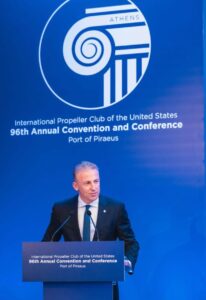 The Convention opened with the speech of Costis Frangoulis, President International Propeller Club of the United States, Port of Piraeus and Chairman of the Convention’s organizing committee, who welcomed delegates and spoke about the event’s significance for Greece and the international maritime community.
The Convention opened with the speech of Costis Frangoulis, President International Propeller Club of the United States, Port of Piraeus and Chairman of the Convention’s organizing committee, who welcomed delegates and spoke about the event’s significance for Greece and the international maritime community.
He said: “This is a significant Convention for the International Propeller Club, for the global shipping industry and for Greece. This significance is a direct reflection of the role that shipping plays – and the value the worldwide network of the Propeller Club contributes to the maritime sector and global industries generally.
“We are coming together again after two years’ absence due to the Covid pandemic. We are together for shipping and together for the future – working together in the interests of shipping and the future of our industry worldwide,” Frangoulis concluded.
The Convention honored individuals and organizations with its annual awards, naming Melina Travlos, President of the Union of Greek Shipowners as Maritime Person of the Year, Geraldo Tiedemann as the Propeller Club Person of the Year, the Port of Seattle as the Propeller Club Port of the Year and the Port of Piraeus walked away with the new International President’s Award for Excellence. The awards were presented by James Patti, President of the International Propeller Club of the United States.

